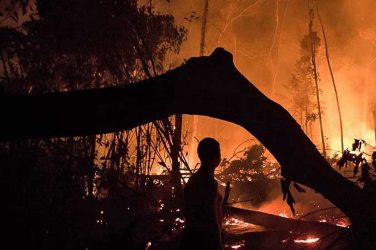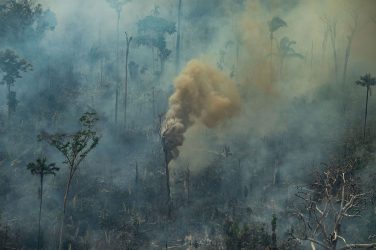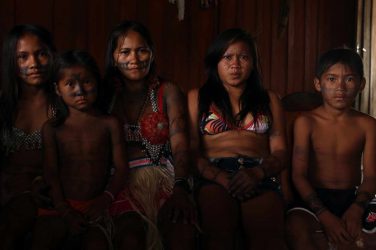From sweeping cuts of funds to protect forests, to the loosening of conservation of indigenous land and measures to boost large-scale property deals, Brazil has embarked on the biggest roll back of environmental protections in two decades, former government officials and campaigners said.
Amid a political upheaval and a economic crisis, Brazil is backsliding on its commitments to protect land rights, the Amazon rainforest and the indigenous people who depend upon it, environmentalists say.
The changes are the biggest shift in Brazil’s environmental policies since it adopted a new constitution in 1988 at the end of a military rule, said Adriana Ramos from the Social and Environmental Institute (ISA), a Brasília-based campaign group.
“It’s a serious crisis,” a former Brazilian cabinet minister told the Thomson Reuters Foundation on the condition of anonymity. “We are backsliding on land use and new demarcation of indigenous peoples’ land.”
Supporters of measures to remove protected area status for more than one million hectares of land say the changes are overdue.
Brazil is suffering its worst recession on record and large-scale agriculture offers has boosted exports, giving the country’s rural lobby more clout, Ramos said.
Proponents of moves to relax regulation and spending cuts say they are necessary to boost growth and get more than 13 million unemployed Brazilians back to work.
“If it wasn’t for that contribution (from agriculture), we would likely be forecasting another fall in gross domestic product,” said Rodolfo Margato, an economist with Santander Brasil, in São Paulo last month.
The government will spend this year working to pass the new series of new environmental and mining laws, cabinet minister Eliseu Padilha said, outlining future priorities.
“These are measures we can take to make the country more prosperous,” Padilha told lawmakers in the capital.
Big Cuts
As part of efforts to close its yawning budget deficit, Brazil’s government has launched a series of wide-ranging spending cuts, led by President Michel Temer who took power following the impeachment of his predecessor last year.
The environment ministry has been hit hard, with its budget slashed by more than 40 percent this year, according to government figures.
Funding at the National Indian Foundation (FUNAI), the government body responsible for protecting the rights of Brazil’s 900,000 indigenous people has been slashed also by more than 40 percent.
FUNAI has drawn criticism from rural lawmakers who say it is giving away too much land to indigenous people by making biased assessments of their historical claims.
“The budget cuts will obviously have a major impact on our work,” a senior government official working on environmental protection told the Thomson Reuters Foundation on condition of anonymity.
The cuts come in tandem with a rise in deforestation in the Amazon, the world’s largest tropical forest and crucial for absorbing carbon dioxide emissions. Deforestation increased by 29 percent last year following previous reductions.
Conservation Areas
Among the proposed changes are measures to reduce the size of conservation areas in the Amazon by more than a million hectares – an area larger than Jamaica.
The changes to conservation areas, put forward by Temer at the end of 2016, are expected to be passed by Brazil’s Congress in the coming months, according to environmentalists.
“Cutting protected areas at a time when deforestation rates are increasing is the opposite of what Brazil needs,” Greenpeace Brazil campaigner Cristiane Mazzetti told the Thomson Reuters Foundation.
But the moves have the support of some local politicians, such as Atila Lins, a lawmaker from Amazonas State, because he says they will benefit his constituents by opening more land for farming and other economic activities.
“A decision (to reduce the size of protected areas)… will not cause any environmental impact,” he wrote on his Facebook page.
Other proposed measures include relaxing the environmental licensing rules for big infrastructure projects, opening sales of farmland to foreigners, and loosening rules for approving new mining projects.
Land Grabbing
Lawmakers are also debating a plan to amend property registration rules that critics say would lead to an increase in “land grabbing” known locally as “grilagem”.
Politicians supporting the move say changes to land laws would make it easier for small farmers and poor Brazilians to formally own properties where they have lived and worked for decades.
Making it easier for landless Brazilians to be granted tenure for their property could be positive, said Ramos from the ISA.
But the amendments would also allow landowners to register territory they had been informally occupying, she said – an incentive for rural businessmen to clear forests or occupy public land to gain formal ownership under the titling program.
“They have also increased the size of what can be regularized to 2,500 hectares,” Ramos told the Thomson Reuters Foundation. “They are effectively legalizing land grabbing.”
Senator Romero Jucá, an ally of Temer from the Amazonian state of Roraima, where many residents do not formally own their land, argues the landless poor will be the prime beneficiaries of the initiative. Jucá did not respond to interview requests.
“We want every family to have their title deeds,” Jucá said in a statement supporting the proposal. “This legislation will improve the lives of millions of Brazilians.”
This article was produced by the Thomson Reuters Foundation. Visit them at http://www.thisisplace.org














